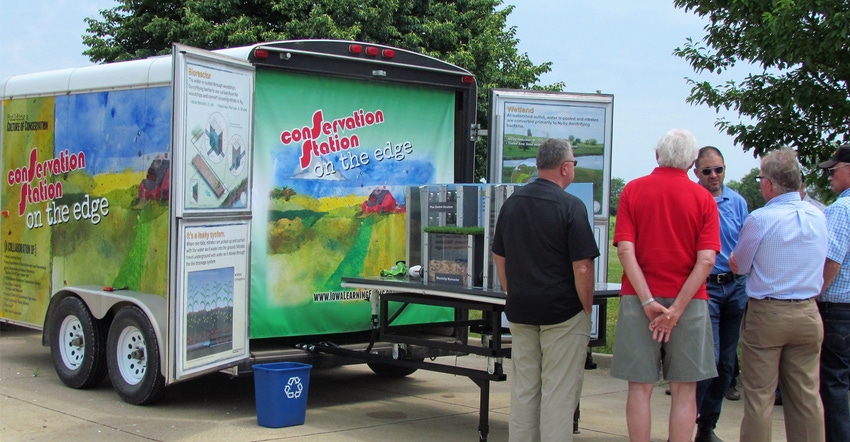March 22, 2019

Editor’s note: This is Part 1 in a new series on the Iowa Learning Farms program and the information it provides for farmers and others as ILF marks its 15th anniversary.
Iowa Learning Farms, the award-winning statewide conservation and water quality education and outreach program housed at Iowa State University, celebrates 15 years of service to Iowa in 2019.
Established in 2004, ILF is building a culture of conservation by encouraging adoption of conservation practices. Farmers, researchers and ILF team members are working together to identify and implement the best management practices that improve water quality and soil health while remaining profitable. Throughout the year, ILF will be sharing stories about its contributors, history and successes and its partner program, Water Rocks!
Allen Bonini: Iowa DNR and ILF adviser

Allen Bonini has been a part of the ILF advisory board since 2005. He is also the supervisor of the Watershed Improvement Section at the Iowa Department of Natural Resources (IDNR). As a part of his responsibility at the IDNR, Allen is responsible for funding provided to ILF through the U.S. Environmental Protection Agency, Section 319 of the Clean Water Act. Here is a recent interview of Allen, conducted by the ILF staff.
What has been your role with Iowa Learning Farms? I’m a member of the Leadership Advisory Committee. In the early years of Iowa Learning Farms, the committee provided guidance and advice, but in recent years, the program has matured to a level that the committee doesn’t need to meet as frequently. The ILF team has developed a strong sense of purpose and direction, so they don’t need our input as often.
What was the purpose of ILF during your involvement? The initial programming was focused on offering educational field days around the state. From this foundation, the ILF teams listened to participants and began to expand what was being delivered and how it was being presented. ILF has done an excellent job of applying evaluations and data gathering to inform decisions on program impacts.
This scientific approach has not only strengthened the program, but led to the creation of innovative programs including the Conservation Station trailers and Water Rocks! While field days are still a staple of ILF, they’ve consistently raised the bar on delivering meaningful and actionable information.
Enlisting experts to deliver information to those that can benefit from it and fostering involvement from every sector of the state has built credibility for ILF. In addition, providing a forum for innovators, early adopters and the voice-of-the-farmer, to share and learn has been very effective. What has allowed the program to remain relevant is the strength of the concept of “Creating a Culture of Conservation.”
How did you impact the program? Prior to joining the DNR, I spent many years working to educate the public on the benefits of recycling. I was able to draw on my experience in education and public engagement to bring some fresh ideas to the table for ILF to consider. Whether recycling or instilling conservation in the forefront of people’s minds, the goal of the program is to change behavior — a daunting but achievable task.
One proven path to changing cultural behavior is to engage the energy and enthusiasm of our youth. I feel that the Water Rocks youth education program associated with ILF is a tremendous tool in moving the dial on conservation in schools across Iowa. Water Rocks took the concept of ILF and applied it to the next generation.
As I saw with recycling, it may take a generation for conservation to be an accepted everyday practice, but as young people gain awareness and devote energy to it, we should see greater adoption and commitment from the public.
What are your fondest memories of working with ILF? The most enjoyable part of working with ILF has been being at the table and participating: offering ideas, refining ideas and seeing it turn into something that achieves results. An important part of this has been watching ILF gather data and use it to create an impactful message and create change.
Why are water quality and conservation outreach important to you and to Iowa? As a lifelong environmentalist, I’m committed to doing what I can to leave the world in better shape than we inherited. This motivates me professionally and personally.
If you could look 15 years into the future, what one thing would you like to see, as a result of ILF activities? It’s a stretch goal, but I would love to no longer need Iowa Learning Farms. We would no longer need to create a culture of conservation because we’ve established a flourishing culture of conservation. Then we can move on to the next big environmental challenge — whatever that may be.
What should the people of Iowa know about Iowa Learning Farms? The leadership team at ILF has been a large part of the program’s success over the past 15 years. The program has benefited from a consistent arc of leadership, with innovative team players who are willing to take risks to keep the program alive and moving forward.
Source: ILF, which is responsible for the information provided and is wholly owned by the source. Informa Business Media and its subsidiaries aren’t responsible for any of the content contained in this information asset.
You May Also Like




